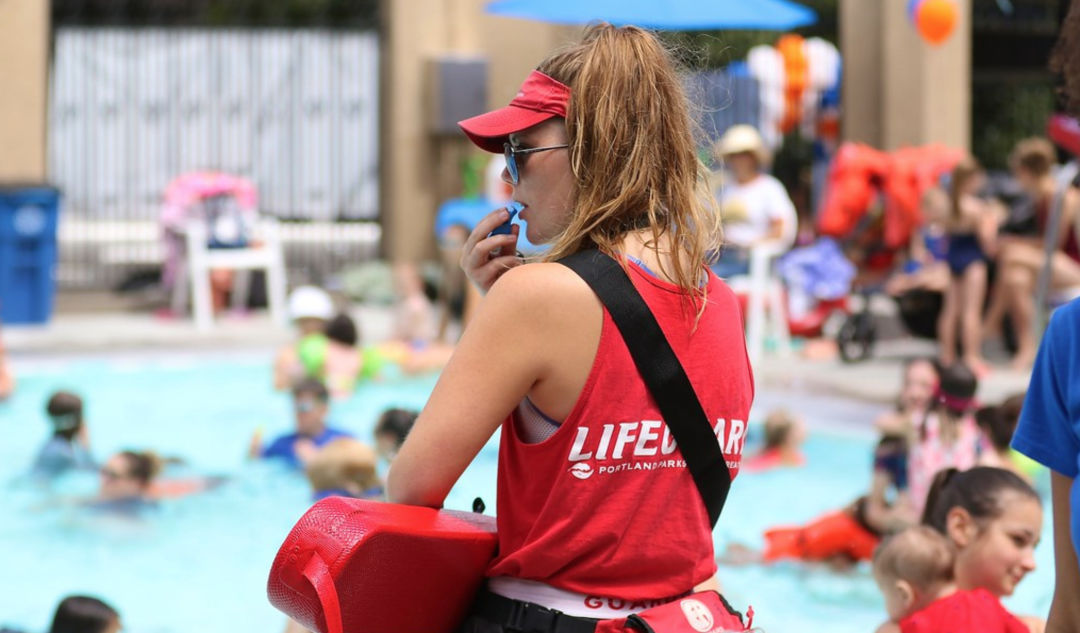Got Shut Out from Summer Swim Lessons in Portland? All Is Not Lost.

A party at Peninsula Pool in the before times.
Sign-ups for summer swim lessons at Portland’s public pools—both a treasured rite of passage and a life-saving skill—opened online at 12:30 p.m. this past Monday.
If you logged on by 12:32 p.m., you were too late.
After summer 2020, when public pools around the city were shut down to prevent the spread of COVID-19, pent-up demand was even higher than usual, pushing a typically competitive process into bloodsport territory.
“I’ve been doing this for seven years and it’s always been crazy,” says Sarah Bentley, mother of two swimmers-in-progress who said she was desperate to get her kids swimming after 15 months of no lessons. This year, however, was more stressful than ever. “I had to make a decision as to which child I was going to prioritize. By 12:32, everything was full. It was chaotic—I was frantically clicking on whatever I could.”
If spaces feel limited at the best of times, this year there are even fewer slots, as each class is currently slated to allow only four student swimmers, instead of the usual six or more—and two slots in each class were set aside for kids referred by nonprofits that work with historically underserved communities, including Black, Indigenous, and families of color, along with immigrants, refugees, and those living on modest incomes.
That meant for those logging in for a spot, there were only two slots in each lesson available—for the entire city of Portland.
Compounding things: Despite having a dedicated funding stream from a voter-approved levy passed in 2020, the Parks Department has had trouble finding lifeguards and swim instructors for this year’s season, said Mark Ross, a spokesman for the department—a problem that’s happening nationwide. In a typical year, the bureau hires about 700 people to work at public pools; so far this year, it has just 300 employees on board.
Overall planning for the summer has been difficult, he says, given the uncertainty around the virus, the variants, vaccine uptake and evolving public health guidelines from the state. Parents like Bentley found out that signing on for lessons at or below the “Seal” level—must be able to do back glides with kicking for up to 10 feet, and front crawl with no side breathing for up to 15 feet—meant they were required to get in the water with their children, while the instructors taught poolside.
If all this sounds untenable, or you were one of thousands of parents who missed your shot, there’s some hopeful news on the horizon for kids and parents as vaccination rates climb and Multnomah County prepares to move into the “low-risk” category as of Thursday.
For starters, Ross says, the dropping rates of new COVID-19 cases could mean a “re-evaluation” of the current policy that swim instructors need to remain out of the water, teaching from the deck.
The city is also planning to open a second round of registrations on June 28, and hopes to be able to add more spaces to each class.
“We expect to be able to increase the number of both swim lessons offered, and the number of participants when staffing and health conditions allow,” Ross says.
Will Howell, the communications director for City Commissioner Carmen Rubio, who oversees the Parks Department, says they’re open to hearing “alternatives to improve the registration process,” which this year requires parents or caregivers to have access to a computer midday, and a work or school schedule that permits them to take the time to register.
“I do feel like I won the lottery,” says Bentley, who as a teacher has the ability to take time out during the summer months, allowing her flexibility in scheduling which ultimately garnered her two spots for her children. As for COVID? Now that she and her husband are vaccinated, she’s anxious to reap the benefits of outdoor recreation for her children, which she feels are beginning to outweigh the risks to them. “My just-turned-5-year-old still won’t put her face in the water. It was desperate times over here.”




